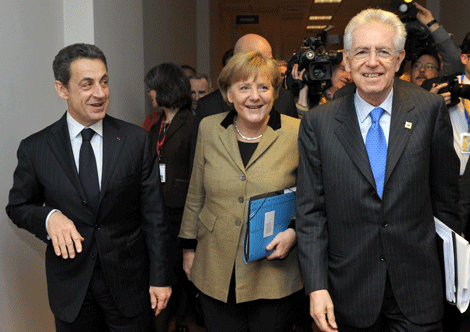EU policy package faces tough political road ahead
Updated: 2012-02-01 07:53
By Fu Jing (China Daily)
|
|||||||||||
|
|
BRUSSELS - European leaders came up with a "multi-front" package to beef up fiscal discipline and tackle stagnant economic growth and rising unemployment on Monday night.
But European analysts said that implementing these decisions would require political determination from every country because greater austerity would mean cuts in social spending for voters, who are against the policy options.
They also said there would be no "magic impact", as pulling Europe out of crisis is a marathon, not a sprint, which will require painful structural reform and institutional redesign.
"We recognize that financial stability is in itself not enough to get out of the economic crisis. We must do more, in particular on economic growth and employment," said Herman Van Rompuy, the president of the European Council, after the informal summit on Monday night.
He added that the European Union is determined to achieve "growth-friendly fiscal consolidation and job-friendly economic growth", which means "slashing deficits, but not our investments for the future".
To achieve such growth, Van Rompuy vowed to create jobs, especially for young people, strengthen the European single market and help small and medium-sized enterprises get access to credit.
"We are being truly tested on how to give people (job) opportunities," CEO of Alcatel-Lucent SA Ben Verwaayen said during an interview with China Daily.
The Associated Press reported that Eurostat, the EU's statistics office, said on Tuesday that unemployment in the 17-nation eurozone ended 2011 at 10.4 percent, a record high for the single currency area since its launch at the start of 1999. The rate in December was the same as November's 10.3 percent.
Spain ranked highest with unemployment at 22.9 percent, while the rate in Greece was 19.2 percent.
Nearly one in four of those aged 18 to 25 in the EU are unemployed. In Spain and Greece, nearly half of those young people are idle.
To create more jobs and opportunities, Verwaayen said it is urgent for European leaders to implement austerity policies while also increasing spending on innovation and research and improve the competitiveness of business.
"It is true that we need austerity (in the debt crisis era) but we also need investment to bring job opportunities for people," Verwaayen said. "What we need is not one or the other. We need both."
However, Verwaayen said that achieving this balance was a huge challenge for European politicians, who face domestic pressures from voters. "Leaders need to make difficult political decisions," Verwaayen said.
He added that within the EU, some countries have the ability to implement austerity policies while also investing, but others don't.
For some debt-ridden countries, the choice will be tough.
Christos Vlachos, director of the Greece-China Business Council, said: "The policies for enterprises sound good. But they are really difficult for Greece to implement."
Debt-ridden countries, Vlachos said, need to think "out of the box" as it is nearly impossible for investors to obtain credit now from banks. For example, Greece needs to attract foreign investors to put money into several big infrastructure projects.
"We can consider selling our airports and building high-speed railways," said Vlachos. "With no foreign investment, it is hard for us to get started again."
During Monday's informal summit, the leaders from 25 EU countries, except the UK and Czech Republic, endorsed the fiscal compact, committing to bringing in a "debt brake" or "golden rule" at the constitutional or equivalent level.
Meanwhile, eurozone leaders endorsed the agreement on the Treaty for the European Stability Mechanism (ESM), which is a permanent firewall against debt-crisis contagion, and it can take effect from July.
But there are still problems involving the resources of the ESM, though the International Monetary Fund has pledged to offer help to European countries.
Concerning Greece, Van Rompuy said the EU welcomed progress made in debt write-off negotiations with the private sector, and he called on the Greek authorities and the troika to agree on the steps "to put the current program back on track".
However, German Chancellor Angela Merkel told reporters in Brussels: "Greece's debt sustainability is especially bad. You have to find a way through more action by the Greek government, more contributions by private creditors, for example, in order to close this gap."
Daniel Kahn, chief partner of Paris-based law firm Kahn & Associates, said a number of important decisions were made. It is very important for European companies and entrepreneurs that Europe accelerates integration, Kahn said.
"The situation today is too complex and not open enough," he said.
"Those measures taken as a whole clearly go in the right direction, making Europe a real single market, with a common set of rules applying," Kahn said. "We just hope that those proposals will be followed by quick results."
China Daily
Today's Top News
President Xi confident in recovery from quake
H7N9 update: 104 cases, 21 deaths
Telecom workers restore links
Coal mine blast kills 18 in Jilin
Intl scholarship puts China on the map
More bird flu patients discharged
Gold loses sheen, but still a safe bet
US 'turns blind eye to human rights'
Hot Topics
Lunar probe , China growth forecasts, Emission rules get tougher, China seen through 'colored lens', International board,
Editor's Picks

|

|

|

|

|

|






